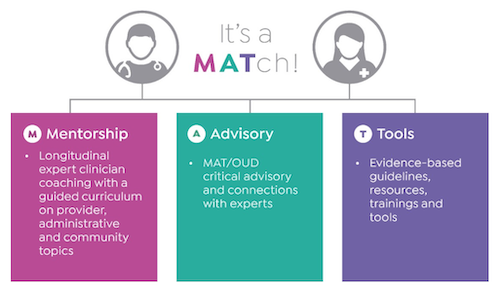
The MATch program connects medications for addiction treatment (MAT) provider champions with providers starting out in their care for patients with opioid use disorder, offering them the resources, tools and mentorship they need to feel supported in providing evidence-based addiction care.
Assuring equitable access to compassionate, evidence-based addiction care is critical in supporting our patients’ needs and addressing morbidity and mortality from substance use. Physicians and advanced practice providers should be prepared in the diagnosis and treatment of patients with substance use disorders, and their support staff should be knowledgeable in how to best support this care.
We are obliged to assure equitable access to MAT and other forms of comprehensive, evidence-based addiction care across the CommonSpirit Health (CSH) enterprise.
Providers need to be encouraged and supported in providing addiction care. This includes mentorship by clinical champions and support with tools and guidelines for providers and their staff who are starting out in providing MAT. A MAT Champions (MATch) Mentorship Initiative will serve as a signature program of the Population Health Addiction Network, supported by the Addiction Treatment Access Group (ATAG).
Design
The MAT Champions program, or “MATch”, will include longitudinal Mentorship, clinical Advisory, and evidence-based, high-value tools and guidelines.
It's a MATch!

Aims
- Increase access to compassionate, evidencebased MAT care
- Promote equity for all substance use disorder patients seeking care across CSH
- Support providers and staff in providing addiction care with high-value tools and guidelines
- Foster professional mentorship and support that promotes evidence-based practice
- Highlight and learn from best-practice champions across CSH